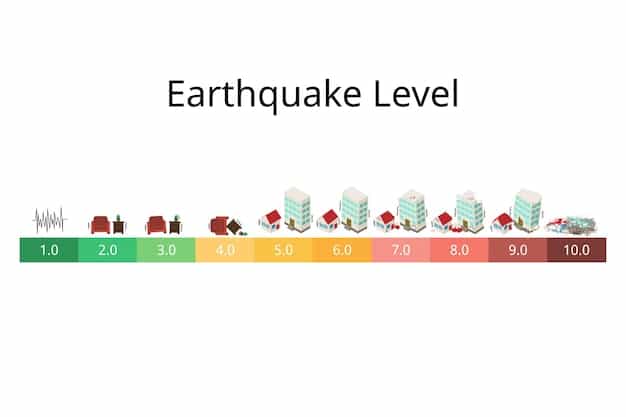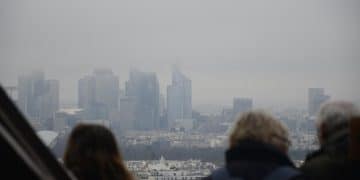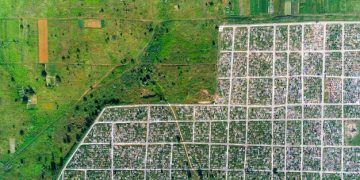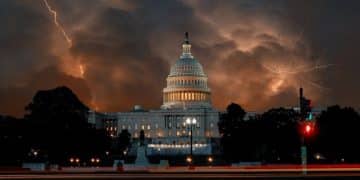Breaking: New Climate Change Report Demands Urgent Action in the US

A new report on climate change impacts reveals escalating threats to the US, calling for urgent and comprehensive action to mitigate severe environmental and socio-economic consequences.
A groundbreaking report has just been released, highlighting the escalating and devastating impacts of climate change across the United States. This isn’t just another study; it’s a dire warning, a call to arms that demands immediate and comprehensive action. The Breaking: New Report on Climate Change Impacts Released – Urgent Call for Action emphasizes that the time for complacency is over; the future of the US depends on the bold steps we take today.
Key Findings of the Climate Change Impact Report
The newly released report paints a stark picture of the climate crisis unfolding across the United States. It details the wide-ranging effects, from rising sea levels threatening coastal communities to increased frequency and intensity of extreme weather events. Understanding these key findings is crucial for grasping the urgency of the situation.
Rising Temperatures and Extreme Heat
One of the most significant findings is the alarming increase in average temperatures across the US. This rise is not uniform; some regions are experiencing more drastic changes than others, leading to prolonged periods of extreme heat. These heatwaves are not just uncomfortable; they pose severe health risks, especially for vulnerable populations.
Sea Level Rise and Coastal Erosion
Coastal communities are facing an existential threat from rising sea levels. The report highlights the accelerating rate of coastal erosion, threatening homes, infrastructure, and vital ecosystems. This isn’t a distant future scenario; it’s happening now, with coastal cities already grappling with increased flooding and displacement.

- Increased frequency of extreme heat days, particularly in urban areas.
- Significant impact on agricultural productivity due to heat stress on crops.
- Strain on energy grids as demand for air conditioning surges.
- Public health crises as heat-related illnesses increase.
In summary, the report underscores that the climate crisis is not a distant threat. It’s a present-day reality that demands immediate attention and action. The detailed findings provide a roadmap for policymakers, businesses, and individuals to understand the challenges and work towards effective solutions.
Impact on US Economy and Infrastructure
The climate change impact report reveals the dire economic consequences of inaction, demonstrating that the costs of addressing climate change pale in comparison to the costs of ignoring it. The US economy and its aging infrastructure are particularly vulnerable to the escalating effects of climate change, presenting both immediate and long-term challenges.
The report highlights increased damages on infrastructure.
Infrastructure is very much at risk
- Increased costs for repairing and rebuilding infrastructure damaged by extreme weather events.
- Disruptions to supply chains and economic activity due to infrastructure failures.
- Decline in agricultural productivity and economic losses for farmers.
- Increased healthcare costs related to heatwaves, air pollution, and other environmental hazards.
In conclusion, the economic and infrastructural impacts of climate change in the US are far-reaching and demand urgent action. Investing in resilience, transitioning to a green economy, and implementing sustainable practices are essential to protect the nation’s economic future and ensure long-term prosperity.
Threats to Public Health and Safety
The new report underscores the rising threats to public health and safety as the impacts of climate change intensify across the United States. From heatwaves and air pollution to the spread of infectious diseases, the report paints a concerning picture of the direct and indirect consequences on human well-being.
Increased Heat-Related Illnesses
The report highlights a significant increase in heat-related illnesses and deaths due to rising temperatures and prolonged heatwaves. Vulnerable populations, such as the elderly, children, and those with pre-existing health conditions, are particularly at risk. Rising temperatures mean more people die due to health problems.

Spread of Infectious Diseases
Climate change is altering the geographic range and transmission patterns of various infectious diseases. Warmer temperatures, changes in precipitation, and more frequent extreme weather events create favorable conditions for the spread of diseases carried by vectors such as mosquitoes and ticks, as well as waterborne illnesses.
Public well being needs to be a priority.
- Increased respiratory illnesses due to poor outdoor and indoor quality.
- Greater risks from contaminated water sources due to flooding.
- Mental health impacts due to displacement and loss.
- Rising fatalities from more frequent and intense heatwaves.
In sum, addressing the threats to public health and safety posed by climate change requires a multi-faceted approach. Strengthening public health infrastructure, implementing prevention and preparedness measures, and addressing the underlying drivers of climate change are essential to protect the well-being of communities across the United States.
Disproportionate Impact on Vulnerable Communities
The urgent call for action in the new climate change impact report emphasizes the disproportionate burden faced by vulnerable communities across the United States. These communities, often marginalized and underserved, are on the front lines of climate change impacts, experiencing the most severe consequences while having the fewest resources to adapt and recover.
Environmental Justice Concerns
The report highlights significant environmental justice concerns as low-income communities and communities of color are disproportionately exposed to environmental hazards exacerbated by climate change. These include air and water pollution, toxic waste sites, and proximity to industrial facilities.
Lack of Resources and Adaptation Measures
Vulnerable communities often lack the financial resources, infrastructure, and social support systems needed to effectively adapt to climate change impacts. This includes investments in resilient infrastructure, access to healthcare, and emergency preparedness.
In particular the lack of resources is hurting the vulnerable.
- Increased exposure to extreme weather events in substandard housing.
- Limited access to healthcare and essential services during emergencies.
- Economic displacement due to climate-related disasters and loss of livelihoods.
- Heightened risk of food insecurity and water scarcity.
In brief, addressing the disproportionate impact of climate change on vulnerable communities requires a commitment to environmental justice and equity. Prioritizing investments in adaptation measures, ensuring access to resources and support systems, and empowering communities to participate in decision-making processes are essential to building a more resilient and equitable future for all.
Policy Recommendations and Call to Action
The new climate change impact report not only highlights the urgent need for action but also provides a set of policy recommendations to address the escalating crisis in the United States. These recommendations call for comprehensive and coordinated efforts across all levels of government, as well as engagement from the private sector and individual citizens. The key priorities are government action.
Transition to Renewable Energy
One of the primary policy recommendations is a rapid transition to renewable energy sources. The report emphasizes the need to phase out fossil fuels and invest in clean energy technologies such as solar, wind, and geothermal power. Phasing out old fuels is a priority.
Investment in Resilient Infrastructure
The report calls for significant investments in resilient infrastructure to protect communities from the impacts of climate change. This includes upgrading transportation systems, strengthening coastal defenses, and improving water management systems.
- Implement carbon pricing mechanisms and incentives for emissions reductions.
- Strengthen regulations on pollution and environmental standards.
- Develop comprehensive adaptation plans at the local, state, and federal levels.
- Promote sustainable land use and conservation practices.
To sum up, the policy recommendations outlined in the climate change impact report provide a roadmap for urgent action. By implementing these strategies, the United States can mitigate the worst impacts of climate change, protect its economy and its environment, and build a more sustainable and resilient future for all.
Individual Actions and Community Engagement
While policy changes and governmental actions are crucial to addressing climate change, individual actions and community engagement play an equally vital role in creating a sustainable future. The climate change impact report emphasizes that collective efforts at the grassroots level can significantly contribute to mitigating climate change impacts and fostering resilience.
Reducing Carbon Footprint
Individuals can take numerous actions to reduce their carbon footprint and minimize their contribution to climate change. These include adopting energy-efficient practices, reducing consumption, and making sustainable transportation choices. Reducing footprint is crucial.
Supporting Local Initiatives
Engaging in community-based initiatives and supporting local organizations working on climate change solutions can amplify the impact of individual actions. This includes participating in community gardens, advocating for local policy changes, and volunteering for environmental causes.
- Advocate for sustainable practices in schools, workplaces, and community organizations.
- Educate friends, family, and neighbors about climate change and its impacts.
- Participate in community resilience planning and preparedness efforts.
- Support businesses and organizations committed to environmental sustainability.
To conclude, individual actions and community engagement complement policy changes and governmental actions to address climate change comprehensively. By taking personal responsibility, supporting local initiatives, and advocating for change, individuals and communities can collectively create a more sustainable, resilient, and equitable future.
| Key Point | Brief Description |
|---|---|
| 🔥 Rising Temperatures | Increased heatwaves and impact on agriculture. |
| 🌊 Sea Level Rise | Threat to coastal communities and ecosystems. |
| 🏥 Public Health Risks | Rising heat-related illnesses and infectious diseases. |
| 🌍 Vulnerable Communities | Disproportionate impacts and environmental justice concerns. |
Frequently Asked Questions
▼
The report primarily focuses on the escalating and devastating impacts of climate change across the United States, emphasizing the urgent need for comprehensive action.
▼
Rising temperatures are contributing to increased heat-related illnesses and deaths, particularly among vulnerable populations like the elderly and those with chronic conditions.
▼
The report points to infrastructure damage from extreme weather, disruptions in supply chains, and economic losses in agriculture as significant economic impacts of climate change.
▼
The report recommends a rapid transition to renewable energy sources, investments in resilient infrastructure, and the implementation of carbon pricing mechanisms to reduce emissions.
▼
Individuals can reduce their carbon footprint through energy-efficient practices, support local initiatives, and advocate for sustainable policies in their communities and beyond.
Conclusion
The urgency conveyed by the new climate change impact report is clear: the US faces escalating threats that demand immediate and comprehensive action. From rising temperatures and sea levels to threats to public health and economic stability, the report underscores the need for collective efforts at all levels to mitigate the worst impacts of climate change and build a sustainable, resilient future for all Americans.





